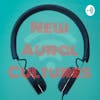Authentic Voices, Physical Sounds

This edition of New Aural Cultures is drawn from a podcasting workshop lead by Dr Dario Llinares at Birkbeck, University of London. Invited by Professor Catherine Grant, Dario introduced 5 PhD students to both the technical, structural and aesthetic elements of podcasting, along with the ways it can supplement or even be integrated as a key part of a researcher's methodology. The PhD students split into groups in which they produced 2 segments outlining the themes and commonalities of their work. What results is an incredibly fruitful discussion that touch on areas such as the voice, authenticity, embodiedness, mediation of the self, creating and revealing truth, composition and decomposition, all of which linked to aspects of podcasting as a medium.
The PhD Students involved were:
Henry Mulhall – Henry’s research looks at how language use in a specific area of Plymouth forms an informal constellation across a range of arts organisation. This is with an aim of identifying communities of practice through language and habitual uses of rhetoric limit that communities access to a wider public sphere.
Paul Martin – Paul’s research looks at the music industry especially the role of A&R in the period of the 1990s in London and specifically Black British electronic music (e.g. Drum and Bass) of the period.
Emily Best – Researching the wider contexts of changes in listening culture in the age of the smartphone and the mediation of voice through technology. Also through working with the National Literacy Trust Emily explores how audio can support literacy in different ways.
Mah Rana - Mah's research derives from her current experience of being a daughter caring for her mother who has dementia, and also as an artist & researcher using crafts & creative practice in community projects.
Lily Green - Lily's research is based on a series of interconnected performance-based social experiments focussing on eusocial insect's intricate social systems. As the first and most enduring global civilisation, what can we learn from them? And what is the basis for people's irrational fear of insects.
Many thanks to Prof. Catherine Grant, Jo Coleman & Ayca Ince Onkal for their support.
Transition music: http://freemusicarchive.org/music/Christian_Bjoerklund/
--- Send in a voice message: https://anchor.fm/newauralcultures/message










